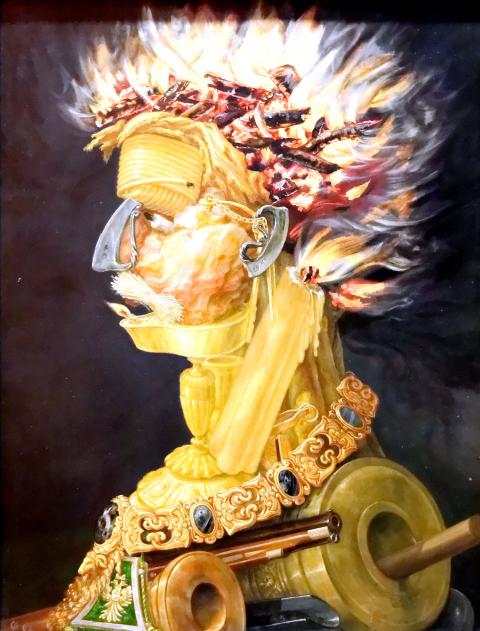Chinese Practice
玩火自焚
(wan2 huo3 zi4 fen2)

Photo: Wikimedia Commons
照片:維基共享資源
play with fire and get burnt
上週的「活用成語」單元提到了英文習語「do not play with fire, or you will get your fingers burned」(不要玩火,不然你會燒傷手指),這是用來警告人別再繼續做某事,因為它可能會引發一連串後果,到最後會反過頭來傷害到自己,就像玩火失了控,起火的人自己最後卻被火舌吞噬。
成語「玩火自焚」──字面意思是玩火卻燒了自己──與英文「do not play with fire, or you will get your fingers burned」的意思若合符節。
這個成語是來自《左傳》。《春秋》是一部史書,記錄春秋時代(西元前七二二~前四八一年)魯國的歷史。《春秋》的文字非常簡略,《左傳》則是對《春秋》的註解──是將《春秋》原來簡略的記載加以擴充說明,在所記載事件發生後多年寫成。《春秋》和《左傳》皆為中國古代經典。
讓我們來看看《春秋左傳.隱公四年》〔西元前七一九年〕中的幾句:
「戊申,衛州吁弒其君完。
夏,公及宋公遇于清。
宋公陳侯蔡人衛人伐鄭。
秋,翬帥師會宋公陳侯蔡人衛人伐鄭。
九月,衛人殺州吁于濮。」
這段文字所說的是,衛國公子州吁(音「須」)謀殺了同父異母之兄衛桓公,以篡奪王位,但結果數個月後,州吁自己也被殺了。
《左傳》對此事評註說,州吁在衛國的篡位,並未獲得大臣或百姓的支持,因此他決定對外國發動戰爭,以藉此提高自己的威望、獲得人民支持。他選擇攻打鄭國,因為鄭國和衛國有宿怨。約在同一時間,宋國的領導層發生了變化──出於事先的協議,宋王把他的兒子公子馮送到鄭國,雖然公子馮較受宋國大臣及百姓愛戴,但宋王只得另立繼位者。繼位的宋殤公便擔心鄭國會幫助公子馮重返宋國、奪回王位。
州吁和宋殤公於是密謀聯軍,並聯合陳國與蔡國的軍隊,一起來攻打鄭國。
聯軍起初對鄭國屢攻不下,魯隱公聽說後便詢問大夫眾仲,依他之見,州吁的計謀是否會成功。眾仲回答說,他只聽過統治者以仁慈和美德贏得人心,但從未聽說可用殘忍和暴力來贏得人心的。眾仲譴責這場殘酷的戰爭,並藉此提出建言,說州吁的所作所為只會讓他的朋友和家人疏遠,並迫使人民起來反對他。眾仲總結道:「夫兵,猶火也,弗戢,將自焚也」(用兵就像玩火:若你不知節制,你就會引火上身,燒死自己)。
雖然州吁最後打敗了鄭國,但他在國內仍不受百姓愛戴,結果被殺了。事情果然不出眾仲所料:州吁最終被自己所放的火所吞噬。
英文「do not play with fire, or you will get your fingers burned」和中文「玩火自焚」這兩個成語,其起源年代相差了數千年、來自完全不同的文化,卻都使用了相同的比喻,以火的不可預測性和力量,來表達相同的意思。
(台北時報林俐凱譯)
這些政客為了選票而煽動分裂,反而造成社會更大的動盪,根本是玩火自焚。
(These politicians have been stoking divisions to attract votes, but ended up causing even greater social unrest. They’ve been playing with fire.)
不要以為你只是逢場作戲,小心你玩火自焚,不但無法全身而退,還賠了夫人又折兵。
(You think you’re just having fun, but you could end up getting your fingers burned. You might not find it that easy to extricate yourself, and you might end up losing your marriage. That will cost you.)
英文練習
do not play with fire,
or you will get your fingers burned
Last week’s Using Idioms mentioned the saying “do not play with fire, or you will get your fingers burned,” used as a warning not to proceed in one’s current course of action, as it may set off a course of events that will come back to hurt you, like a fire going out of control and ultimately engulfing the person who started it.
In Chinese, the idiom 玩火自焚 — literally, play with fire and get burnt — is a good match.
This idiom comes from the zuo zhuan (Commentary of Zuo), a series of commentaries — written years after the recorded events — expanding on the tersely worded annals of the state of Lu, the chunqiu (Spring and Autumn Annals), covering the Spring and Autumn period (722 to 481 BC). Both the zuozhuan and the chunqiu are included among the ancient Chinese classics.
Consider this extract from the Fourth Year of Duke Yin entry of the chunqiu, on the events of 719BC, commented on in the zuo zhuan:
“In the year of Wushen, Zhou Xu of Wei murdered his ruler, Huan.
In summer, the duke met with the duke of Song at Qing.
The duke of Song, the marquis of Chen, an army of Cai and an army of Wei invaded Zheng.
In autumn, Hui led a force, and joined the duke of Song, the marquis of Chen, the army of Cai, and the army of Wei, in the invasion of Zheng.
In the ninth month, the people of Wei put Zhou Xu to death in Pu.”
That is, Zhou Xu usurped the state rulership by murdering his half-brother, Duke Huan, but was himself put to death a matter of months later.
According to the commentary, Zhou Xu’s usurpation of power in Wei wasn’t well-received by either his ministers or his people, and he determined to wage war with another state to win himself some credibility and to get the people behind him. He chose Zheng, a state with which Wei had a troubled relationship. At roughly the same time, a change in leadership had occurred in the state of Song. Although the ministers and people had preferred the ruler’s son, Prince Feng, a prior agreement had obligated the ruler to name a different successor, and Prince Feng was sent to the state of Zheng. Duke Shang of Song was concerned Zheng wanted to help the prince return to Song and claim power.
Zhou Xu and the duke of Song conspired to combine their forces, together with the armies of the states of Chen and Cai, and attack Zheng.
After their initial attempt failed, Duke Yin of Lu asked a senior official, Zhong Zhong, whether Zhou Xu would succeed. Zhong Zhong replied that he had heard of rulers winning their people over through kindness and virtue, but never through ruthlessness and violence. By prosecuting this cruel war, the official advised, Zhou Xu would only alienate himself from his friends and family and cause the people to rise against him. Zhong Zhong concluded by saying 夫兵,猶火也,弗戢,將自焚也: armies are like fire: if you don’t keep events under control, you will burn.
In the end, Zheng was defeated, but Zhou Xu remained unpopular at home, and was eventually put to death. Zhong Zhong had been right in his prediction: the Duke was eventually engulfed in flames of his own making.
Both the English and Chinese idioms, whose origins are separated by millennia and come from entirely different cultures, use the same metaphor, citing the unpredictable nature and power of fire, to refer to the same idea.
(Paul Cooper, Taipei Times)
You know smoking is bad for your health. You’re playing with fire, in more ways than one.
(抽菸有害健康,在不同意義上來說,你都是玩火自焚。)
Playing the stock market can be lucrative, but sometimes it can be like playing with fire.
(玩股票可以賺錢,但有時候會像是玩火自焚。)

A ‘Dutch angle’ is a classic camera technique that has been used in filmmaking since the 1920s, when it was introduced to Hollywood by German Expressionists. Why is it called the Dutch angle if it’s actually German? In fact, it has no __1__ to the Netherlands. The term “Dutch” is widely believed to be a misinterpretation of “Deutsch,” which means German in the German language. In any event, the name stuck, and the Dutch angle remains a popular cinematic tool to this day. This technique involves tilting the camera on its x-axis, skewing the shot to create a sense of

A: After “God of Songs” Jacky Cheung sang for late singer Khalil Fong recently, music streaming service KKBOX also paid tribute to Fong by releasing his greatest hits online. B: The 20th KKBOX Music Awards ceremony is taking place at the K-Arena in Kaohsiung tomorrow. Fong performed at the ceremonies in the past. A: Who are the performers this year? B: The performers include Taiwanese groups 911, Wolf(s), Ozone, Singaporean pop diva Tanya Chua, and K-pop group Super Junior. A: South Korean stars actually took four spots among KKBOX’s 2024 Top 10 singles, showing that K-pop is still

Historians are rethinking the way the Holocaust is being presented in museums as the world marks the 80th anniversary of the liberation of the last Nazi concentration camps this month. Shocking images of the mass killings of Jews were “used massively at the end of World War II to show the violence of the Nazis,” historian Tal Bruttmann, a specialist on the Holocaust, told AFP. But in doing so “we kind of lost sight of the fact that is not normal to show” such graphic scenes of mass murder, of people being humiliated and dehumanized, he said. Up to this

Dos & Don’ts — 想想看,這句話英語該怎麼說? 1. 能做的事都做了。 ˇ All that could be done has been done. χ All that could be done have been done. 註︰all 指事情或抽象概念時當作單數。例如: All is well that ends well. (結果好就是好。) All is over with him. (他已經沒希望了。) That’s all for today. (今天到此為止。) all 指人時應當作複數。例如: All of us are interested in his proposal. All of us are doing our best. 2. 我們這麼做有益於我們的健康。 ˇ What we are doing is good for our health. χ What we are doing are good for our health. 註︰以關係代名詞 what 引導的作為主詞的子句,動詞用單數。如: What he said is true. 3. 大家都沿著步道跑。 ˇ Everybody runs along the trail. χ Everybody run along the trail. 註︰everyone 是指一大群人,但在文法上一般用單數。 4. 桌上有一本筆記本和兩支筆。 ˇ There were two